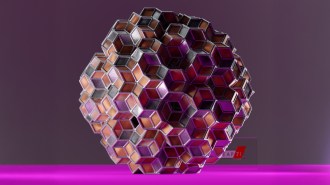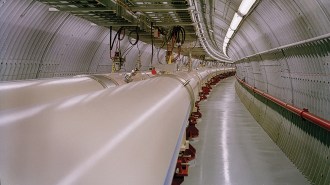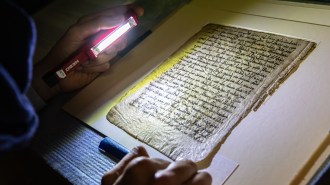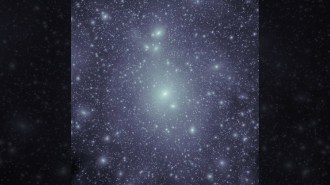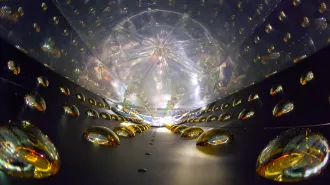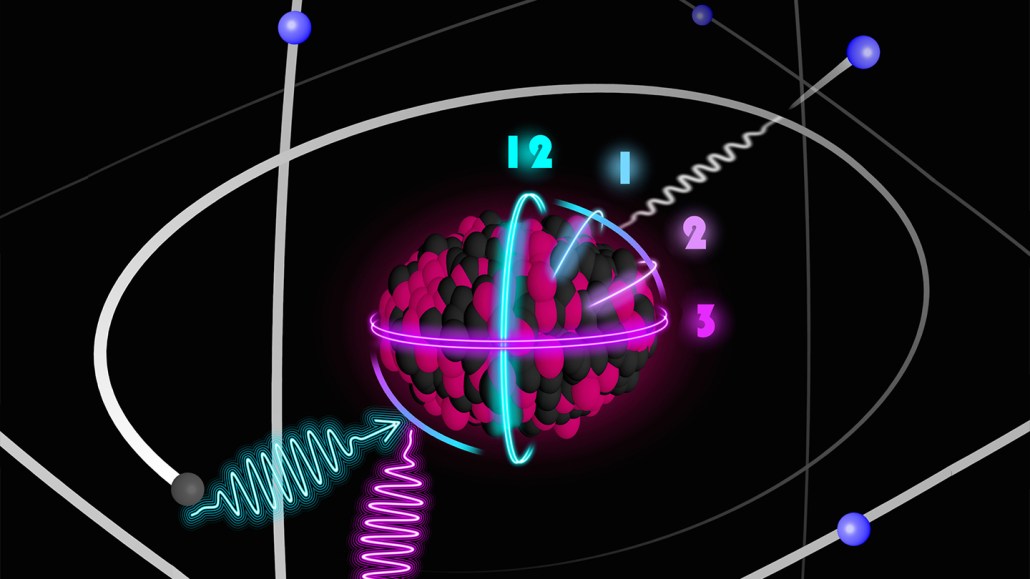
Physicists aim to build nuclear clocks, one depicted in this artist’s interpretation, which could keep time better than atomic clocks, the most precise clocks ever created.
TU Wien
- More than 2 years ago
Read another version of this article at Science News Explores
Nuclear clocks could be the GOAT: Greatest of all timepieces.
If physicists can build them, nuclear clocks would be a brand-new type of clock, one that would keep time based on the physics of atoms’ hearts. Today’s most precise clocks, called atomic clocks, rely on the behavior of atoms’ electrons. But a clock based on atomic nuclei could reach 10 times the precision of those atomic clocks, researchers estimate.
Better clocks could improve technologies that depend on them, such as GPS navigation, physicist Peter Thirolf said June 3 during an online meeting of the American Physical Society Division of Atomic, Molecular and Optical Physics. But “it’s not just about timekeeping.” Unlike atoms’ electrons, atomic nuclei are subject to the strong nuclear force, which holds protons and neutrons together. “A nuclear clock sees a different part of the world,” said Thirolf, of Ludwig-Maximilians-Universität München in Germany. That means nuclear clocks could allow new tests of fundamental ideas in physics, including whether supposedly immutable numbers in physics known as fundamental constants are, in fact, constant.
Atomic clocks tally time using the energy jumps of atoms’ electrons. According to quantum physics, electrons in atoms can carry only certain amounts of energy, in specific energy levels. To bump electrons in an atom from one energy level to another, an atomic clock’s atoms must be hit with laser light of just the right frequency. That frequency — the rate of oscillation of the light’s electromagnetic waves — serves as a highly precise timekeeper.
Like the electrons in an atom, the protons and neutrons within atomic nuclei also occupy discrete energy levels. Nuclear clocks would be based on jumps between those nuclear energy levels, rather than those of electrons. Notably, nuclei are resistant to the effects of stray electric or magnetic fields that can hinder atomic clocks. As a result, nuclear clocks “would be more stable and more accurate,” says theoretical physicist Adriana Pálffy of Friedrich-Alexander-Universität Erlangen-Nürnberg in Germany.
But there’s a problem. To tally time with nuclei, scientists need to be able to set off the jump between nuclear energy levels with a laser. “Nuclear levels are not normally accessible with lasers,” said theoretical physicist Marianna Safronova of the University of Delaware in a June 2 talk at the meeting. For most nuclei, that would require light of higher energy than suitable lasers can achieve. Luckily, there’s one lone exception in all of the known nuclei, Safronova said, “a freak-of-nature thing.” A variety of thorium called thorium-229 has a pair of energy levels close enough in energy that a laser could potentially set off the jump.
Recent measurements have more precisely pinpointed the energy of that jump, a crucial step toward building a thorium nuclear clock. Thirolf and colleagues estimated the energy by measuring electrons emitted when the nucleus jumps between the two levels, as reported in Nature in 2019. And in a 2020 paper in Physical Review Letters, physicist Andreas Fleischmann and colleagues measured other energy jumps the thorium nucleus can make, subtracting them to deduce the energy of the nuclear clock jump.
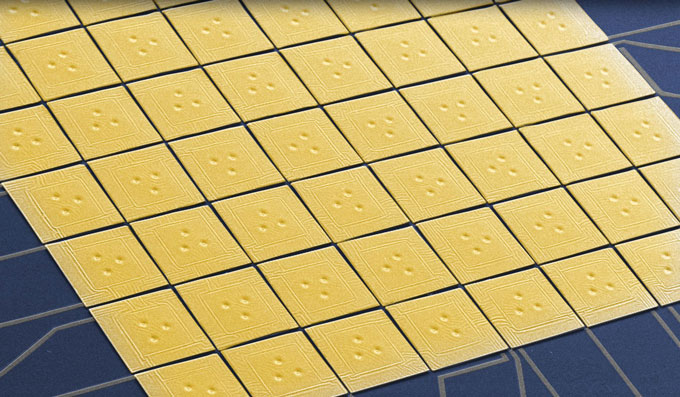
The teams agree that the jump is just over 8 electron volts in energy. That energy corresponds to ultraviolet light in a range for which setting off the jump with a laser is possible, but at the edge of scientists’ capabilities.
Now that physicists know the size of the energy jump, they are aiming to trigger it with lasers. At the meeting, physicist Chuankun Zhang of the research institute JILA in Boulder, Colo., reported efforts to use a frequency comb (SN: 10/5/18) — a method of creating an array of discrete frequencies of laser light — to initiate the jump and measure its energy even better. “If it’s a success, we can directly build a nuclear-based optical clock from that,” he said at the meeting. Thirolf’s team also is working with frequency combs, aiming for a working nuclear clock within the next five years.
Meanwhile, Pálffy is looking into using what’s called an “electronic bridge.” Rather than using a laser to directly initiate an energy jump by the nucleus, the laser would first excite the electrons, which would then transfer energy to the nucleus, Pálffy reported at the meeting.
Nuclear clocks could let researchers devise new tests to determine if fundamental constants of nature vary over time. For example, some studies have suggested that the fine-structure constant, a number that sets the strength of electromagnetic interactions, could change (SN: 11/2/16). “This nuclear clock is a perfect system to search for variation of fundamental constants,” Victor Flambaum of the University of New South Wales in Sydney said at the meeting. The devices could also test a foundation of Einstein’s general theory of relativity called the equivalence principle (SN: 12/4/17). Or they could search for dark matter, elusive undetected particles that physicists believe account for most of the universe’s matter, which could tweak the ticking of the clock.
The potential of nuclear clocks is so promising that for Fleischmann, of Heidelberg University in Germany, it took just an instant to settle on tackling the quandary of how scientists could build a nuclear clock, he says. It was “from the very first second clear that this is a question that one should work on.”
